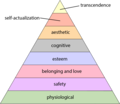Abraham Harold Maslow (/ˈmæzloʊ/ MAZ-loh; April 1, 1908 – June 8, 1970) was an American psychologist and eugenecist who created Maslow's hierarchy of needs...
65 KB (7,629 words) - 21:18, 8 November 2024
Maslow's hierarchy of needs is an idea in psychology proposed by American psychologist Abraham Maslow in his 1943 paper "A Theory of Human Motivation"...
45 KB (5,369 words) - 04:43, 6 November 2024
Maslow on Management (originally Eupsychian Management: A Journal) is a work on industrial psychology by Abraham Maslow, first published in 1965. Maslow's...
5 KB (514 words) - 04:59, 19 August 2024
Maslow may refer to: Masłów (disambiguation), a Polish place-name Abraham Maslow Maslow's hierarchy of needs, a theory in psychology proposed by Abraham...
430 bytes (82 words) - 22:57, 22 September 2022
Self-actualization (section Abraham Maslow's theory)
Self-actualization, in Maslow's hierarchy of needs, is the highest personal aspirational human need in the hierarchy. It represents where one's potential...
29 KB (3,853 words) - 12:47, 27 August 2024
Law of the instrument (redirect from Maslow's hammer)
of the hammer, Maslow's hammer, or golden hammer is a cognitive bias that involves an over-reliance on a familiar tool. Abraham Maslow wrote in 1966,...
12 KB (1,519 words) - 15:56, 19 September 2024
Theory X and Theory Y (section McGregor and Maslow)
McGregor's work was rooted in motivation theory alongside the works of Abraham Maslow, who created the hierarchy of needs. The two theories proposed by McGregor...
13 KB (1,592 words) - 15:59, 21 December 2023
Reverence (emotion) (section Abraham Maslow)
people critically evaluate all cultures and forms of reverence.: 155 Abraham Maslow in his Religions, Values, and Peak Experiences, deals extensively with...
19 KB (2,309 words) - 02:21, 19 October 2024
Abraham Maslow established the need for a "third force" in psychology. The school of thought of humanistic psychology gained traction due to Maslow in...
57 KB (7,010 words) - 09:40, 7 November 2024
individuals.[citation needed] The concept was originally developed by Abraham Maslow in 1964,[citation needed] who described peak experiences as "rare, exciting...
13 KB (1,493 words) - 11:33, 19 October 2023


